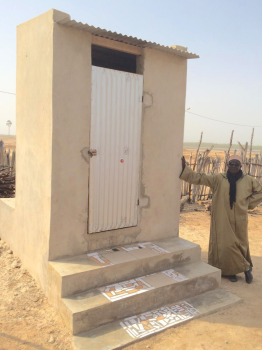Focusing on Sanitation in Rural Senegal and Africa’s Commitment to Safely Managed Sanitation
In 2015, Africa adopted the Ngor Declaration on Sanitation and Hygiene. The Ngor Declaration outlines 10 commitments to achieve universal access to adequate and sustainable sanitation and hygiene services and eliminate open defecation by 2030.
The vision of the Ngor Declaration closely aligns with Sustainable Development Goal (SDG) 6. The accurate monitoring of the implementation of Ngor commitments on sanitation and hygiene is critical for Africa to assess their progress.
Senegal’s water supply and sanitation sectors are among of the most developed in sub-Saharan Africa. However, the country still faces challenges, especially regarding Ngor commitment #1: “Focus on the poorest, most marginalised and unserved aimed at progressively eliminating inequalities in access and use and implement national and local strategies with an emphasis on equity and sustainability.” As a matter of fact, Joint Monitoring Programme 2015 statistics show that while 66 percent of Senegal’s urban population has access to basic sanitation, only 35 percent has access in rural areas.
This lack of sanitation access impacts the poorest users in terms of quality and cost of services. Sanitation in areas with 3,000 to 30,000 people is particularly problematic and remains a specific challenge for public authorities and international development stakeholders. For it is these small cities and large rural towns that are experiencing very rapid growth. Housing and water consumption tend to be similar to those in larger urban centers. Although it is difficult to connect these small- to mid-size towns to sewage systems for financial, technical, and institutional reasons, the Government of Senegal has developed a vast onsite sanitation program to reach 1 million people and is developing a new strategy for small and medium towns based on ongoing pilot experiences in the field with various projects.
Programs attempt to meet the challenges of sanitation in these intermediary areas. However, consultation with users, quality of services, and sustainability are not sufficiently incorporated into design, even though they have an important role to play. In 2018, Senegal moved in the right direction by establishing a Directorate of Studies and Planning for Sanitation under the National Sanitation Office that will bring Senegal’s long-term rural strategy in line with SDG 6 and progress on the Ngor commitments.
For Senegal to meet Ngor commitment #1, it is essential that the country track safely managed sanitation coverage, monitor government resources allocated to sanitation, and address inequality. To this end USAID’s Water for Africa through Leadership and Institutional Support (WALIS) project is funding an 18-month project, in close collaboration with the Ministry of Hydraulics and Sanitation, to support the development of an information and monitoring system for the water, sanitation, and hygiene sector in Senegal.
Once implemented, this monitoring system will inform national planning processes and support accountability mechanisms put in place to ensure adherence to the Ngor commitments. In this way Senegal will better address the access gap between rural and urban areas, rich and poor.
By Theophane Boutrolle, WASH Specialist for WALIS


